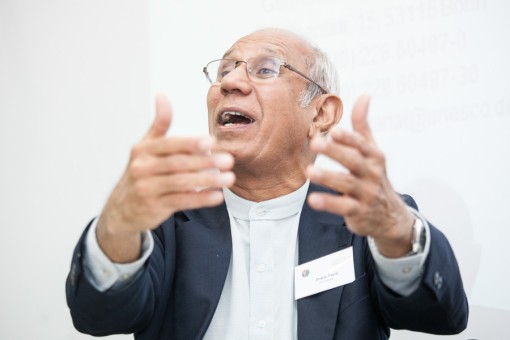Fascinating workshops, interesting presentations and thought-provoking panels with Alternative Nobel Prize (Right Livelihood Award) laureates awaited the young international scientists and researchers who travelled to Bonn to participate in the Right Livelihood College (RLC) workshop from 31 August until 7 September. “Environmental Change and the Next Sustainability Generation” was the name of the seven-day workshop organised by the RLC Bonn and funded by the DAAD, the second such workshop held this year.
Five winners of the Alternative Noble Prize and an assemblage of other high-profile scientists from across the disciplines who work on issues of sustainability came to Bonn for the Right Livelihood College (RLC) event. They talked to the participating PhD candidates and students about their current projects and underlined the importance of relevance and applicability in research. “The neat thing about the RLC workshop series is that it brings young researchers together with experts from the field,” says Dr. Till Stellmacher, project head at the RLC Bonn, part of the Center for Development Research (ZEF) at the University of Bonn. “We give doctoral students the chance to engage in trans-disciplinary exchange and to consider their work in its applied dimension.”
Alongside workshops and presentations held at the ZEF, the RLC Bonn also held four large events open to the public, which were organised together with the Youth Future Project and the City of Bonn. As part of this outreach programme, Prof. Dr. Ernst Ulrich von Weizsäcker, one of Germany’s leading experts on sustainability, met with international students and the public at the University Club Bonn to discuss and explore the limits of economic growth.
Putting insight into practice
All of the presenters spoke to one specific success factors for researchers: applied thinking. “Don’t just focus on publishing your results,” said UNESCO’s Dr. Lutz Möller. “Focus on making sure that the insights gained from your research are heard and get implemented.” The DAAD alumnus Duc Le from Vietnam took these mentoring words to heart. “What I’ve heard here at the RLC workshop is quite helpful,” he said. “My work focuses on putting the theories of sustainable development into practice. Right now I am analysing the current situation in Vietnam and developing models for sustainable state forest management.”
“Be the ones who make a difference.”
Professor Michael Succow, laureate of the 1997 Alternative Nobel Prize and founder of a foundation for nature conservation, has high expectations of the young researchers and scientists. “In the past, scientific knowledge has been used to increase productivity and performance. The Earth has been plundered as a result,” said Succow. “The onus is now on research to turn this undesirable development around.” The Malaysian Alternative Nobel Prize winner Professor Anwar Fazal prompted the young academics to take action, saying, “You can contribute to a more sustainable way of living. You can be the ones who make a difference!”
More impressions from the workshop in our image gallery on facebook
During the RLC workshop held in May 2013, young scientists and researchers and Alternative Nobel Prize laureates discussed human rights in developing countries.
Read the article
Interview with Alternative Noble Prize laureate Prof. Anwar Fazal
What is the Right Livelihood College Campus Bonn?
The Right Livelihood College (RLC) Campus Bonn, founded in 2011, is financed by the DAAD and is seated in the Center for Development Research (ZEF) at the University of Bonn. The RLC campus in Bonn is one of seven RLC campuses worldwide. It promotes exchange between Alternative Noble Prize laureates and doctoral candidates from developing nations. Access to the rich and extensive knowledge and experience of the prize laureates provides these young scientists and scholars from the developing world with the training they need to become effective decision-makers and multipliers in their home countries. The DAAD provides three-year PhD scholarships for doctoral research conducted at the RLC Campus Bonn in the areas of social justice, poverty and sustainability.
www.rlc-bonn.de
What is the Alternative Noble Prize?
The Right Livelihood Award, widely known as the Alternative Nobel Prize, was presented for the first time in 1980 by the Right Livelihood Foundation in Stockholm. The prize recognises individuals and organisations who are "offering practical and exemplary answers to the most urgent challenges facing us today". RLA recipients are actively involved in the promotion of peace, human rights and environmental issues.
www.rightlivelihood.org






